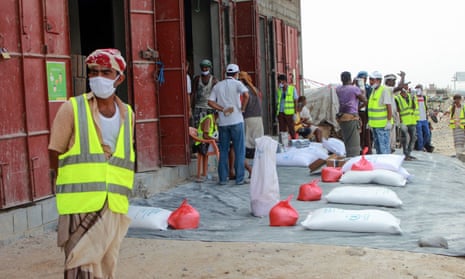The heads of all the UN’s major agencies have issued a graphic warning of the risk of coronavirus to the world’s most vulnerable countries after disclosing that international donors had pledged around a quarter of the $2bn the UN requested for its emergency Covid-19 response in March.
In an open letter shared before publication with the Guardian, the world’s most senior emergencies, health and development officials, warned that help for the world’s weakest countries was in everyone’s “interest to stop the virus from spreading unchecked, destroying lives and economies, and continuing to circle around the world”.
In particular, the agency heads are calling for $350m to be specifically earmarked for the establishment of a rapidly enhanced and expanded UN global logistics system, including key regional hubs, to serve as air and cargo bridges to move key personnel and equipment as conventional air traffic has shut down, or movement has been restricted.
The plan envisages using two air transport centres in Europe – still accessible by commercial flights – to then transport aid staff on charter to key crisis areas, including the Middle East and Africa, as well as the provision of seven field hospitals around the world dedicated to treating humanitarian workers who fall sick with the disease while working.
The plan mirrors early discussions among some European countries in recent days to set up their own humanitarian air bridge via the EU’s civil protection coordination mechanism.
Amid mounting concern that countries in the developing world with the least ability to contain coronavirus could become reservoirs for the disease, driving new waves of the virus around the planet, the letter adds that without a stepped up effort “the global response could stutter to a halt”.
The call followed mounting concern both inside the UN system and among prominent NGOs of the devastating impact of coronavirus on the countries already vulnerable and heavily dependent on international aid because of high poverty, widespread social insecurity or conflict.
The letter is signed by the heads of the World Food Programme, World Health Organization, United Nations Children’s Fund, UN Refugee Agency and International Organisation for Migration, among others, as well as by Mark Lowcock, the UN’s emergency relief coordinator.
Describing the latest funding appeal, Lowcock underlined that full funding for the logistics effort was critical to the UN’s Covid-19 mitigation efforts. “If the world does not step up for this, nothing else happens,” he told the Guardian.
Lowcock described the situation in Yemen in particular – where the UN is already desperately short of funds – as an example of a worst-case scenario.
“The most difficult place is Yemen, partly for funding reasons. We feed 13 million people there every month but are in process of closing 31 of 40 main programmes over the next several weeks.
“If we can’t keep getting supplies in and out there’s going to be a huge tragedy. Central African Republic is also difficult as is Democratic Republic of Congo and South Sudan.”
The appeal for a joined-up global response followed months in which countries have largely forged their own paths as many global political institutions – including those of the EU – have struggled to find consensus.
Describing coronavirus as the “most daunting challenge facing humanity since the second world war”, the letters adds: “Coronavirus knows no borders, spares no country or continent, and strikes indiscriminately.
“In this race against an invisible enemy, all countries must fight back but not all begin from the same starting line. In countries where the world’s most vulnerable need humanitarian aid and supplies to beat back the pandemic, cancelled flights and disrupted supply routes hit disproportionately hard.
“It is in everyone’s interest to stop the virus from spreading unchecked, destroying lives and economies, and continuing to circle around the world.”
Lowcock added: “This isn’t just about compassion and empathy it’s about hard self interest. Nobody is going to be safe, until everyone is safe. The places [where] humanitarian agencies work are potentially huge reservoirs where it is hard to mange the virus.”
The letter followed the appeal launched by the UN secretary-general, António Guterres, on 25 March amid the escalating global economic meltdown prompted by the pandemic. However, it revealed that despite the appeal for $2bn only $550m has so far been pledged.
It also came just a week after Donald Trump’s suspension of funding to the WHO, the main UN agency leading the fight against coronavirus.
One of the most pressing concerns has been the devastating impact of the collapse of commercial aviation relied on by humanitarian organisations in places like Africa to move staff and supplies, requiring UN’s World Food Programme to massively expand its transport and logistics services – including its UN Humanitarian Air Service – which is available to all aid professionals, which itself requires an extra $350m.
Chris Lockyear, international secretary general of Médecins Sans Frontières, said that, like many agencies, MSF was involved in a “race against time with the pandemic” even as it had been forced to shut down programmes across the world.
“Time is fundamental. We have already seen how devastating this disease is in places with highly developed health expertise and security. If the consequences have been devastating in Europe and the US imagine what we are looking at in places with perhaps only a handful of doctors.”
As the Guardian reported last month officials and experts are concerned not only with the impact of the disease in developing countries but of the knock-on effect in pre-existing emergencies in places such as Afghanistan, Syria, Yemen and Zimbabwe, where humanitarian supply lines to hugely vulnerable populations are already extremely fragile.
